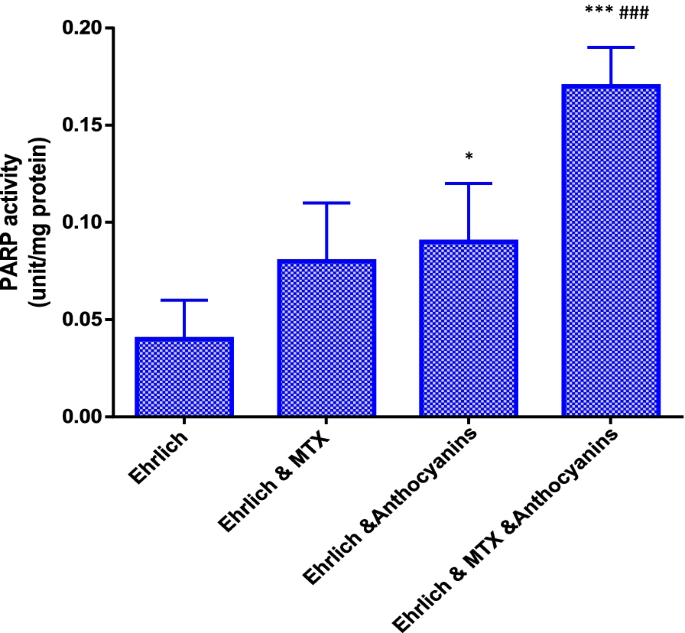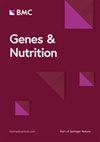Impact of anthocyanin on genetic stability in mammary adenocarcinoma-induced mice treated with methotrexate
IF 3.5
3区 医学
Q1 Medicine
引用次数: 0
Abstract
Genetic instability leads to genome mutations, changes in nucleotide sequences, rearrangements, and gains or losses of part of the chromosomes. This instability can initiate and develop cancer. This study evaluated genomic stability in methotrexate and anthocyanin-treated mammary adenocarcinoma model. Seventy albino mice were divided into seven groups: negative control, anthocyanin, methotrexate, Ehrlich’s solid tumor; Ehrlich’s solid tumor and methotrexate; Ehrlich’s solid tumor and anthocyanin; and Ehrlich’s solid tumor, methotrexate, and anthocyanin groups. Tumor weight and size were evaluated. Serum arylesterase activity was low in all the induced tumors and those treated with anthocyanin, methotrexate, or both. Poly[adenosine diphosphate (ADP)-ribose] polymerase activity was high, and glutathione S-transferase activity was low in the tumors treated with anthocyanin, methotrexate, or both, compared with that of the untreated tumor. There was an increase in DNA damage in the mice with solid tumors and those injected with methotrexate or methotrexate and anthocyanin, compared with that in the untreated mice. There was a decrease in genetic instability and DNA damage in the tumor-bearing mice treated with anthocyanin, with a concomitant increase in nuclear poly[adenosine diphosphate (ADP)-ribose] polymerase activity, compared with those of the untreated group. Anthocyanin exerted positive effects in the treatment of mammary adenocarcinoma.

花青素对甲氨蝶呤治疗乳腺腺癌小鼠遗传稳定性的影响
遗传不稳定性导致基因组突变、核苷酸序列改变、重排以及部分染色体的获得或丢失。这种不稳定性会引发和发展癌症。本研究评估了甲氨蝶呤和花青素治疗乳腺腺癌模型的基因组稳定性。70只白化小鼠分为7组:阴性对照、花青素组、甲氨蝶呤组、埃利希实体瘤组;埃利希氏实体瘤和甲氨蝶呤;埃利希实体瘤与花青素;和埃利希氏实体瘤,甲氨蝶呤和花青素组。评估肿瘤的重量和大小。血清芳基酯酶活性在所有诱导肿瘤和花青素、甲氨蝶呤或两者同时治疗的肿瘤中均较低。与未治疗的肿瘤相比,花青素、甲氨蝶呤或两者治疗的肿瘤中聚二磷酸腺苷(ADP)核糖聚合酶活性高,谷胱甘肽s -转移酶活性低。与未治疗的小鼠相比,患有实体瘤的小鼠和注射甲氨蝶呤或甲氨蝶呤和花青素的小鼠的DNA损伤有所增加。与未治疗组相比,接受花青素治疗的荷瘤小鼠的遗传不稳定性和DNA损伤有所减少,同时核聚二磷酸腺苷(ADP)核糖聚合酶活性增加。花青素对乳腺腺癌的治疗有积极作用。
本文章由计算机程序翻译,如有差异,请以英文原文为准。
求助全文
约1分钟内获得全文
求助全文
来源期刊

Genes and Nutrition
Biochemistry, Genetics and Molecular Biology-Genetics
CiteScore
7.90
自引率
0.00%
发文量
14
审稿时长
13 weeks
期刊介绍:
This journal examines the relationship between genetics and nutrition, with the ultimate goal of improving human health. It publishes original research articles and review articles on preclinical research data coming largely from animal, cell culture and other experimental models as well as critical evaluations of human experimental data to help deliver products with medically proven use.
 求助内容:
求助内容: 应助结果提醒方式:
应助结果提醒方式:


